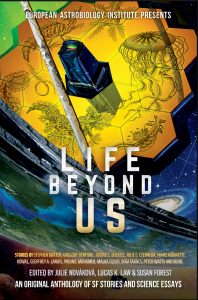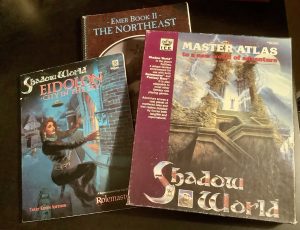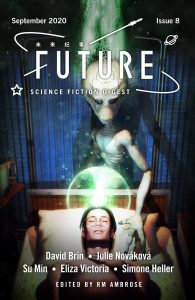For the second entry, we’re looking to Brazil! Renan Bernardo, living and writing in Rio de Janeiro, was generous enough to talk to me. Renan is the author of powerful and thought-provoking stories like “Look to the Sky, My Love” and “Soil of Our Home, Storm of Our Lives”, often using solarpunk aesthetics and touching on ecological topics even in his fantasy tales.
SH: Tell me about your multilingual background. Do you write in more than one language? And how did you end up doing so?
RB: Yes, I write in Portuguese and English. My first language is Portuguese, but a significant part of my fiction is now in English. Since I was a young boy I always had a close relationship with English. With English and US content soaking almost every inch of the globe, I grew up with games, books, TV shows and movies in English.
For a long time, I actively searched for content only available in English. Ten years ago, there was a lot of fiction written and published in English that wasn’t translated into Portuguese, so I ended up buying books in English. It only became easier with ebooks. That is all to say that content in English (mainly fiction written in English) was always part of my life.
As to writing in English, it started as the conjunction of three factors: 1) I like the language. I was always fond of other languages, and since English is the only one I’m comfortable writing in besides Portuguese, I started venturing myself in it around 2016 (with some frustrated attempts in 2014, actually); 2) The anglophone SFF market is much more robust than the Brazilian one. Though the Brazilian market has been growing quickly, the anglophone one is still where most opportunities reside; 3), Like it or not, English is not the language of the English or US people anymore. It’s a global language understood in many countries, so writing in English is also an opportunity to broaden your readership.
What’s going on when you write? How are you navigating between your languages?
At this point, I feel mostly at ease when writing in English. Of course, not as much as writing in Portuguese, but enough to make me doubt less what I am writing. Deep down, on an “internal” level, I know there are microtranslations and associations my brain does all the time, which doesn’t happen in Portuguese.
One thing I notice (and that my friend Fabio Fernandes told me years ago) is that your brain is rewired every time you shift from one language to another. It happens with me. I sense that there’s a kind of adaptation you need to go through when you’re writing in English then switch to Portuguese (and vice-versa). It’s like your mind needs rest to readapt. With time, this becomes easier, of course, and it certainly varies with different people.
Another interesting aspect of navigating between languages, at least for me, is that I notice my voice writing in English is essentially different from the Portuguese one. And it is even more evident when I translate a story myself. Doesn’t matter that it’s the same story. The voices are different. I think this is a crucial part of navigating between languages because sometimes you feel the story needs more than a translation—perhaps some tweaks here and there, a different paragraph, a new line of dialogue that wouldn’t work in the other language. It’s pretty cool, actually.
How do you think your first language affects the way you write in your second language? Does it feel like dead weight, or is it enriching what you do?
I think it enriches the experience. When you’re starting, you’re still too rooted in your first language and the rewiring I mentioned before is more difficult to do, more prone to errors, and more exhaustive. But with time, it’s like your mind is working in the second language, but your first language is always there in the background to help and enrich your text with details and expressions you wouldn’t have otherwise.
Does it go deeper, maybe to narrative structures or themes?
Yes! There are a lot of things that I think are not only a consequence of the first language, but a range of cultural aspects including it. What we often learn when we’re writing in English (in workshops, books, videos, etc) is that we need to have an active protagonist, avoid the passive voice, and respect some “ground rules”. These are useful as guides for beginners trying to find their way into writing, but they’re definitely not rules. In Brazil and many Latin American countries, we have different ways of telling stories and many of them have the passive voice or an inactive protagonist as important elements of the narrative. Vida Cruz has excellent presentations and texts about this issue.
It affects both theme and structure. For instance, the three-act structure is something we take from the English-speaking world. It works, but there are a lot of different ways to tell a story that doesn’t rely on it. And though I’m no expert on the reasons for that, I’m sure the Sapir-Whorf hypothesis plays a part in it, meaning that the way people tell stories is essentially different because language influences it. And we can go deeper: countries with languages and writing systems dating back thousands of years (like China); countries with oral traditions (like Brazil before the Europeans arrived); countries with a history of being exploited (like Brazil again). All those things certainly influence the way we tell stories, create structure, and which themes are most important.
My story “The Norms From Up Here”, first released in Portuguese and upcoming in English (translated by myself), is a good example. I know where I wanted to go with it in my home language, but when I translated it into English many things didn’t work and I had to rewrite several parts because it relied heavily on how Portuguese works and how it is perceived (the story itself is about language). The outcome is the same, the story is the same, but it’s like the Portuguese version was built with a certain kind of material and the English version was built with a different kind of material.
You said English is a global language, accessible to a large audience. Do you feel English is the lingua franca of sff, bringing us together? Or a hegemony that comes with a cost?
It is unintentionally the lingua franca of SFF. But it comes with high costs. To write in English we need to partially adapt to it. We also “change” it based on our experiences, but first we must adapt to it. And it comes with a price. We know we’re shaping our stories to what is expected from us in many senses. It’s very hard not to adapt and still be published, though it’s slowly changing with many good initiatives from several SFF magazines. When editors accept works that they think are deeply grounded in their author’s cultural backgrounds and experiences, they can be sure it was adapted (at least in part) to conform to the English-speaking market expectations.
English is an imperial language. So when we’re writing in English, you can think of it as the native peoples of North America having to learn it centuries ago, or people across the globe being forced by their jobs to learn it so they have more opportunities. Empires concentrate power and bend everything they touch to their whims. That’s a lot of what happens (and happened) with the British literal empire and the US cultural (and sometimes quite literal) empire. My point is: we turn to English in our writing because it has power, and power concentrates opportunities, people, money, visibility, and so on. Not only that, but this imperial force also absorbs the power of other nations, weakening other languages in the process. An example: Brazilian readers consume a lot more fiction written by American/English authors than they consume Brazilian authors. For a new writer, it’s not unusual to mimic the styles and voices imposed by the English language.
That’s the bad and inevitable side of writing in an imperial language. The good side is that it really brings a lot of people together, from different backgrounds, all over the world. And it makes us all see each other a little better. It helps develop empathy and compassion for the other.
Did you encounter obstacles to writing in your second language? Do you feel welcome in the anglophone publishing/writing world as a multilingual writer?
A lot. And I still do. I’ve posted a few of them on Twitter over the last few years. They include people questioning why would I use São Paulo as a setting or people saying that non-English names take them out of the story. And those were the most polite. I’ve heard worse. And though they seem like nuisances (and sometimes they are), they affect you. You’re already writing in a language that’s not your first. It’s not nice hearing those things. It makes you search doubly for validation and recognition, even if in small chunks.
And of course there are always the technical obstacles. You can never get all of your phrasing and word choices right, no matter how you try it. Over time, you learn how to deal better with it, but sometimes you can’t be sure if a line of dialogue would be something a person would say in real life, for example. If you live in an English-speaking country, it might be easier, but if you don’t, you keep questioning yourself (and asking for native speaker friends to read your stories). Of course movies, TV shows, and reading dialogue helps in that sense.
That said, I feel quite welcome in the anglophone-speaking world. There are lots of “sub-communities” inside the SFF world and they’re all united and always helping each other. When you’re starting, it’s all scary and you’ll bump into bad people (it’ll happen anyway, anywhere) that might scare you off, but I’d never replace the good things that came to fruition for being a part of a few different small SFF communities (all online in my case).
What’s the biggest difference between publishing in your home country and internationally?
The size. Brazil is an enormous country, but our SFF community is tiny compared to the anglophone one. We have less than 10 relevant magazines right now, most of them struggling to remain alive—though the market has been growing fast. Meanwhile, The Submission Grinder lists hundreds of open markets right now, all of them having a lot of varied focuses and priorities. So “size” is really a world that encompasses many things: the size of the readership, the amount of opportunities, the amount of money paid to a writer, how long you’re able to survive.
Is there a piece of advice or some resource you’d like to share with writers who are considering writing in another language?
One advice is: get in contact with people who write in your second language. That helps a lot and you’ll make good friends on the way.
As for resources, if you’re writing in English having Portuguese as a first language, this section of my website might help a bit: Escrita em inglês
In general, I would recommend being part of a workshop that works for you (so you can get in contact with native English speaking writers and could have your work read by them). Another piece of advice I have is accepting that there will be mistakes because you’re not using your first language (no matter if you’re starting now or a seasoned writer). They’re part of the process and they’ll bother you. Accept that. But they won’t stop you from being published.
What’s a favorite word (or concept) in your first language you wish you could transfer to the language you write in?
Diminutives. English takes all the power out of them, sadly. “Cadeirinha” means “little chair”, but every Brazilian person knows it can be so much more. “Amorzinho” is something like “sweetie” (or, more literally, “my small love”), but there’s no way you can convey it in English in the same way. And it goes for almost every word in diminutive form (“Mãezinha”, “Cafezinho”, “Pouquinho”, etc). The fun thing is they’re not always used to refer to small things and one word might have a wide spectrum of different meanings.
Thank you, Renan, for scrutinizing ground rules and boldly claiming English for everyone!
Don’t miss Renan’s essay The Exophonic Writer’s Journey on the SWFA blog and his latest story “The Whittler” in Translunar Travelers Lounge. Find him on Twitter or visit his web page.

Look for the next entry in The Ever-Shifting Lexicon in 2 weeks! Or subscribe now via newsletter:



 has always been more diverse in ways high fantasy (rpgs) at this time simply weren’t. And it has been developed to be ever more so, because Terry stayed, uncovering bits and pieces, telling the story, the multitude of histories and seeds and glimpses that made his world come alive.
has always been more diverse in ways high fantasy (rpgs) at this time simply weren’t. And it has been developed to be ever more so, because Terry stayed, uncovering bits and pieces, telling the story, the multitude of histories and seeds and glimpses that made his world come alive.
 First of all, phew! All my writing attempts since 2018 got shelved during first draft, and while people kept congratulating me on my last story, I plunged into a pitch-black hole. Then along came this healthcare prompt to yank me out of my comfort zone, with a tight deadline on top. And here we are, finished story! “Keloid Dreams” originated in thoughts about healthcare getting under your skin via implanted sensors, combined with the idea of robots caring for people. How would they become accepted, what would their humanizing features have to be so that you’d trust them with your parents?
First of all, phew! All my writing attempts since 2018 got shelved during first draft, and while people kept congratulating me on my last story, I plunged into a pitch-black hole. Then along came this healthcare prompt to yank me out of my comfort zone, with a tight deadline on top. And here we are, finished story! “Keloid Dreams” originated in thoughts about healthcare getting under your skin via implanted sensors, combined with the idea of robots caring for people. How would they become accepted, what would their humanizing features have to be so that you’d trust them with your parents?